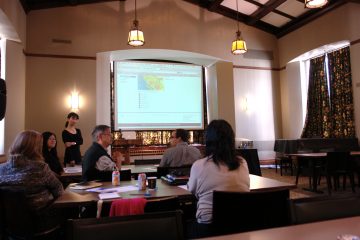
Here: Valuing, Recognizing and Acknowledging Place. Photo by Erin Watkins
This strategically designed series creates a unique learning experience for participants by combining mini-class lectures, interactive group activities, and one-on-one discussions designed to evoke critical thinking and self-reflection. The diversity of experiences among both participants and presenters has been cited as one of the program’s key strengths. Past participants have noted they appreciate the honesty and integrity of the conversations led by facilitators who model how to “walk the walk” of negotiating difficult conversations.
The series is designed to serve the needs and interests of the UBC teaching and learning community. Sessions are also open to the public. We welcome everyone to participate as part of your professional development.
Learn more and register for upcoming sessions. We also encourage you to join our mailing list for regular updates on our events.